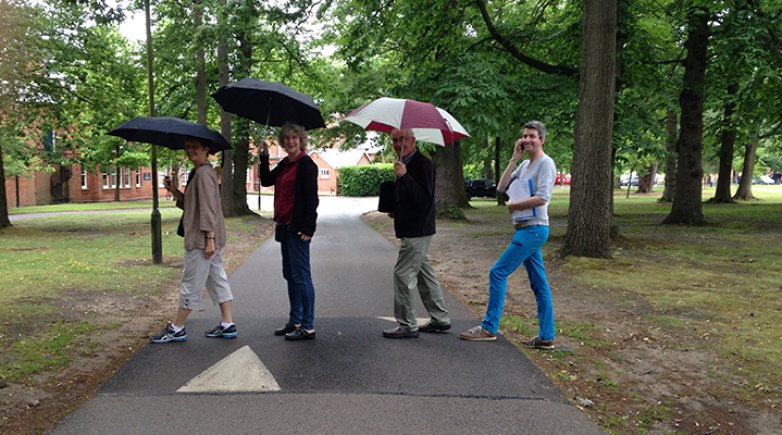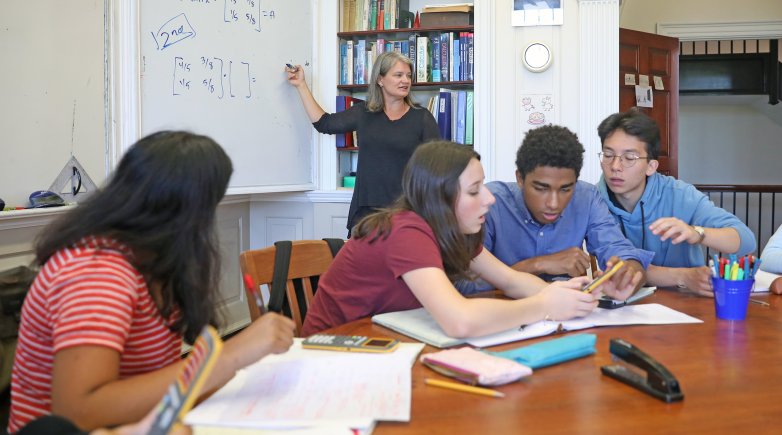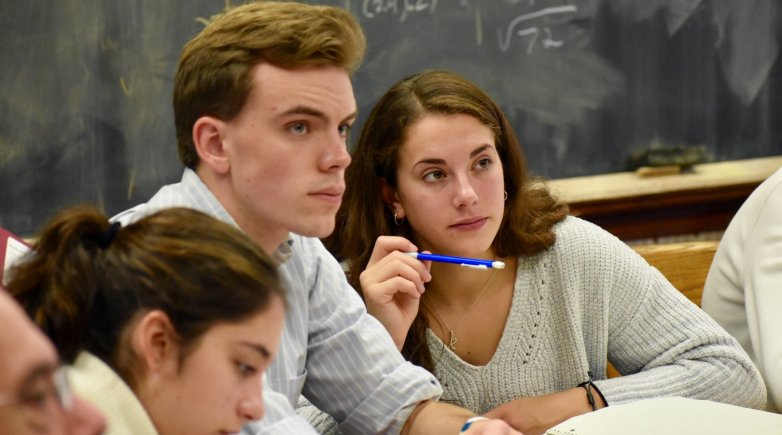Spotlight on Exeter Mathematics Institute
Editor’s note: In 2018, mathematics faculty member Laura Marshall became EMI’s director. For information about EMI workshops, contact Laura via email or phone: 603-686-2544.
Over a ten-week period each summer, teams of Academy mathematics faculty depart New Hampshire laden with calculators, compasses, Slinkies and Skittles®, destined for public schools across the United States. Once in Baltimore, Newark, Chicago, Cleveland or any of nearly two dozen other cities, they deliver four-day interactive workshops to local math teachers who are eager to sharpen their skills through interaction with Exeter’s unique curriculum and Harkness method of student-centered instruction.
The faculty members are participants in the Exeter Mathematics Institute (EMI), an initiative that began over two decades ago as the vision of mathematics faculty member Eric Bergofsky. “I wanted to help public school teachers, particularly those in urban environments, and I thought that Exeter teachers had a lot to share,” Bergofsky says simply.
From the outset, EMI’s focus was pedagogy. Bergofsky’s approach – mirroring Exeter’s Harkness classrooms in terms of teacher interaction, the integration of technology, and the integration of algebra and geometry—was warmly embraced by his fellow faculty members. It also got the attention of an independent foundation, from whom Bergofsky successfully secured funding for the first 17 consecutive years. When that funder finally stepped away in 2009, the Institute turned to the public schools and private donors for support.
In 2013, mathematics faculty member Gwyn Coogan took over as EMI’s director and is now shepherding the program through a new round of growth and innovation. Since becoming director, Coogan has overseen new workshops in Chicago, Illinois as well as in the Ohio cities of Cincinnati and Mason. And last summer, for the first time in EMI’s history, a workshop was offered to a group of public and private school teachers overseas, hosted by Wellington College, a day and boarding school just outside London. The initiative was prompted by Wellington teacher Aidan Sproat, who participated in a summer school program at Exeter and became interested in the Harkness method. Fifty one teachers participated and a second workshop is planned for this summer.
“From a math point of view, a problem-centered approach with tremendous variety and gradual progression is exactly what we strive for,” says Sproat. “Implementing this through the Harkness approach is a perfect fit….A number of teachers went away motivated to try similar approaches in their own schools; of course … many appreciated that writing such a course for themselves would be taxing but potentially worthwhile.”
Mindful of such challenges, Coogan is enthusiastic about opportunities for expanding EMI’s offerings to curriculum development initiatives for participating school districts. “We’re finding that many of the teachers who take our workshops are interested in adopting a problem-based curriculum and they’re looking to us for help in creating that content. One of the best aspects of Exeter’s curriculum is that it’s modified every year to meet our students’ needs, so we’re familiar with the process. And because we’re going out into these school districts and building relationships with individual teachers, we’re in a unique position to help.”
Both Bergofsky and Coogan are quick to point out, however, that none of these initiatives would be possible were it not for the generosity of numerous Academy donors including Judith Bigelow and Fred Pittman ‘51. The parent of four Exonians, Bigelow is a strong proponent of EMI and a major contributor to the program. “Judith has been an amazing supporter of EMI, a super donor really,” says Coogan. “She’s inspiring and supportive and so interested in improving public education—it’s wonderful working with her.” Bigelow’s support, notes Coogan, has enabled EMI to offer new workshops to public school teachers in a number of cities including Chicago and Cincinnati.
“I admire Exeter’s attitude – ‘We’re an institution that’s grounded in a larger community, and if we have resources we can share, we will do that.’ – I think that’s very important,” says Bigelow. “I’m delighted to support EMI and give children outside of Exeter the chance to experience the high quality education that my kids have received. I also believe that the professional development goes both ways – the Exeter teachers learn as much from the experience as the public school teachers do. My hope is that as more people learn about EMI, they’ll feel moved to support it, too.”
Pittman has seen the program’s potential from its earliest days, says Bergofsky, providing valuable support for EMI workshops in Southern cities such as Charleston, South Carolina and Jackson, Mississippi. “One of the biggest challenges is matching up interested school districts with donors, and supporters like Dr. Pittman have been incredibly generous in that regard,” notes Coogan.
“I liked the idea of the program from the moment I heard about it,” says Pittman. “I’m all in favor of introducing others to the wonderful things that can happen through the use of the Harkness approach, which is such a valuable means of fostering dialogue between students. When students gather around that oval table, they teach each other – it creates a wonderful atmosphere for learning.” Pittman says that he’s also had wonderful correspondence with teachers who have participated in the workshops. “They tell me the experience has changed the way they teach math.”
“I’ve never before seen teachers cheer at the end of a professional development workshop, but that’s what happened last year,” says Ben Sabree, a mathematics instructor at St. Andrew’s Episcopal School in Ridgeland, Mississippi, who helped to organize a 2015 EMI workshop for public school teachers in Jackson. “The feedback was overwhelmingly positive; everyone rated the workshop as extremely useful and I expect all of the teachers to return for this summer’s offering.”



